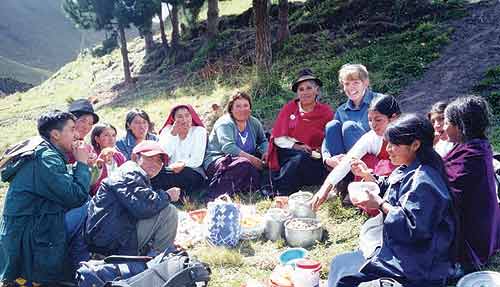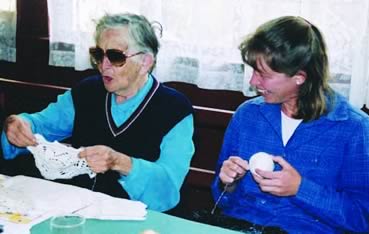I will remember you
Taking home memories of family, love, and friendship at the end of a blessed three-year mission journey
By Carolyn Beukeboom
October 2003
Return to Table of Contents
Print Article

Enjoying an outing and sharing a potluck lunch with health promoters from rural communities. Scarboro missioner Carolyn Beukeboom spent three years with the indigenous peoples of Ecuador, doing nursing and health care work.
In mid-July I returned to Canada after working for three years as a nurse in Punin, Ecuador. Those years were filled with wonderful experiences. Leaving and saying goodbye was very difficult as I had made many friends and created bonds with people that I knew would last a lifetime. Here are some of those unforgettable special memories that I have of my time in Ecuador.
One of my responsibilities as a nurse at the Hospital La Consolata in Punin was to coordinate the outreach program. I worked with a group of 14 young indigenous men and women who came from the surrounding villages to learn about health promotion and disease prevention. Once a week I would accompany a physician to the villages where we would set up a temporary clinic and give medical attention.
The lives of these health promoters, some of whom are married with children, was a difficult one. Their daily routine at home consisted of attending to the family's livestock, milking the cows, herding the sheep, and carrying large loads of alfalfa herb for their smaller animals (guinea pigs and rabbits), and working in the fields. So when it came near for my return to Canada, we decided to take a day away as a group.
We piled 14 people into the hospital vehicle to visit an area of the country where most of our group had never been. The two-hour drive took us past the beautiful Mount Chimborazo to a small village called Salinas. This was the educational part of the journey where we had a tour of several factories run by the local people. We visited the cheese, chocolate, wool, sausage, soccer ball, and medicinal plant factories. These are amazing accomplishments for this small community, through the support of some European groups.
Through my mission experience, I have gained more than I could possibly have given.
After this excursion we went to the hot springs at the base of Chimborazo. We had agreed on a communal lunch and everyone brought something to share. After the meal of potatoes, rice, corn, popcorn, and beans, we all enjoyed the lovely hot baths.
Hot water to these rural people of Punin is an extreme luxury. Most are accustomed to doing everything-bathing, washing dishes, and doing laundry-with freezing cold water. To watch them play in the water, hear their giggles and laughter and shouts of joy made this day definitely well worth it.
"Eso es la vida," (This is the life) they said, as they reluctantly returned to Punin and to their daily routine of life. It had been a wonderful day. It was a moment to forget the rigors of working in the fields and tending to the animals. Once again these people had taught me the lesson of enjoying the simple things in life.
One afternoon one of the health promoters came to visit me with her three-year-old son, Angel. She asked if I could do her a favour. "Sure," I said, not really knowing what she was going to ask. She proceeded to tell me that in her culture the first haircut of their children had to be done by someone special and would I be willing to cut her child's hair.
What a strange request. Not knowing what else to do, I agreed and cut the child's hair. She told me that the next day she would bring the child to a real barber. I just had to do the initial cut to fulfill the tradition.
The longer I stayed in Punin and learned more about the people, the more I could appreciate their way of life and customs. I was honored that she had chosen me for this special task.
Another delightful woman in my life in Punin was Tia Fanny, a 76-year-old woman whose farm was a 30-minute walk from where I lived. I spent many hours talking with her, or just listening to her stories. I learned so much about her life, her family, and the customs of the Ecuadorians.

Learning to crochet with Tia Fanny. Carolyn spent many hours with this wonderful woman, listening and learning about her life and about Ecuador.
As I had no television, I had to occupy my evenings with other activities and therefore I learned to crochet and to paint tablecloths with Tia Fanny. I developed a very warm relationship with the whole family and spent many lunches and dinners with them. In return I taught English to the young children, ages eight and 13. They were my family away from home and during those lonely moments I knew I could go there and feel loved and a part of the family.
One of my closest friends was Magdelena, a co-worker at the hospital. Although she lived in the city of Riobamba with her husband, her family was from Punin. Her parents were farmers and worked hard looking after the fields and attending to the animals.
Magdelena and I would spend a lot of time together chatting about life, and so I got to know her really well. She was a beautiful young woman who was always well dressed. When I was first invited to her family's home I was shocked at just how poor they were. The house was very simple. Curtains separated the rooms and her mother cooked over an open fire. This made me realize that although some people appear to be well off, in fact they really are not.
It was an honour for me when Magdalena named her first-born daughter Carolina, after me. I was also asked to be the child's Godmother at her baptism last June. And so Magdelena and Carolina will always have a special place in my heart.
These are just a few of the many examples of the people who touched my life while in Ecuador. These moments are sacred and allow me to know that I was loved in the village of Punin and that I loved them in return. I would not trade this experience for anything.
I will miss the people tremendously. However, memories of them will be forever ingrained in my mind and in the pictures that I have. Through my mission experience, I have definitely gained more than I could possibly have given. Although the people face many hardships, I am amazed by their generosity, their sense of welcoming, and their determination to improve their lives and to succeed in this world.
Since returning to Canada and to a new way of living once again, I have begun to question the inequalities that exist in our world. Now I look at many things with a new perspective, and sometimes I don't understand why others don't have the same thoughts as I do.
We have been blessed to live in a beautiful, prosperous country with many resources at our disposal. I have learned that I cannot take for granted what we have when I see the lives of others and how they struggle to live daily. We have to be grateful for our blessings. We have to share with others, and enjoy all the precious moments life offers us.
After serving in overseas mission for three years, Carolyn Beukeboom has returned to Canada and is at McMaster Univesity studying to be a Nurse Practitioner.
Return to Table of Contents
Print Article